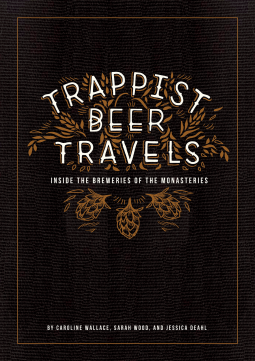
Trappist Beer Travels
Inside the Breweries of the Monasteries
by Caroline Wallace, Sarah Wood & Jessica Deahl
This title was previously available on NetGalley and is now archived.
Send NetGalley books directly to your Kindle or Kindle app
1
To read on a Kindle or Kindle app, please add kindle@netgalley.com as an approved email address to receive files in your Amazon account. Click here for step-by-step instructions.
2
Also find your Kindle email address within your Amazon account, and enter it here.
Pub Date Jun 28 2017 | Archive Date Jan 12 2018
Schiffer Publishing Ltd. | Schiffer
Description
Available Editions
| EDITION | Hardcover |
| ISBN | 9780764352942 |
| PRICE | $24.99 (USD) |
Links
Featured Reviews
 Geoffrey S, Librarian
Geoffrey S, Librarian
Wallace, Wood and Deahl haven’t merely crafted a tale of a beer pilgrimage they took together. Instead, they’ve ended up creating what almost becomes an informative love-letter to the Trappist brewing traditions. The brewers are treated with the utmost respect, with each monastery getting its own chapter, its own personal history told, its own in-depth description of their current brewing operations, and of course an overview of the specific brews that each one produces. Not only those, but each monastery is covered with gorgeous pictures, and helpful snippets of information on what else travelers can do should they ever have the good fortune to visit these establishments that are a mix of prayerful solitude and masterful beer-production. The thoroughness with which each monastery is covered is absolutely top-notch, to put it lightly.
This is not merely a guide to Trappist brewing. It’s of this reader’s opinion that for now, this should be “the” guide for anyone with even the slightest interest in this Catholic order and their magnificent beer-producing traditions.
 Christi S, Reviewer
Christi S, Reviewer
Beautiful book! So much history and travel and information.
 roxi N, Reviewer
roxi N, Reviewer
I'm planning a trip to Belgium soon, and when I was approved to review Trappist Beer Travels, I decided to focus my trip in visiting the breweries mentioned in this book. Being fairly decent beer fan, Trappist beers caught my attention some time ago, but I never truly followed up on the information behind the scenes. This book provides that information, and then some! Gorgeous photos, tips and tricks, beer/brewery information, I'm so excited to try and visit at least one of the monasteries listed!
 Morgan R, Librarian
Morgan R, Librarian
My husband and I are avid beer connoisseurs and we visited Belgium a couple of years ago. We are very interested in Trappist beers, but, unfortunately, we were unable to visit any of the Trappist monasteries. I would like to purchase this book when it is published for us to use as a reference when we plan our next trip to Belgium. I loved the fall color photographs and other graphics used in the book and the organization of the book was wonderful. The information is historical and very interesting. This would be a great addition to any beer snob's bookshelf!
 Reviewer 311821
Reviewer 311821
Disclaimer: I received a free ecopy via NetGalley in exchange for an honest review.
What exactly is a Trappist beer? Beer nerds likely have a pretty good idea already, but for those that don't, this book answers the question nicely. The writers do a good job of explaining what a Trappist monastery is and why the monks might be interested in brewing beer.
There can be some excitement about these beers because they are highly regarded and available in limited quantities. An aspect of this book that I think is really important, which the writers bring up numerous times, is that the monks aren't brewing to make a profit. There goal is to sustain themselves and support their communities and various organizations. The monks also have a specific lifestyle to maintain that devoting full time to brewing would interrupt. These women are very respectful of the monasteries and their inhabitants throughout this book, which is fantastic to see.
I loved the photos. These show off just how varied the monasteries are. Coupled with some excellent historical information, it gives a good sense of how these different locales are similar and different. There is even a short description of the different beers and how widely available they might be. My only real complaint comes in the writing style. With three creators involved, it made it kind of awkward when they tried to express a collective idea. That may just be my personal take on it though.
Beer lovers should find plenty to enjoy in this book, whether they've had numerous Trappist beers or just find inspiration to pick up their first.
 Reviewer 312499
Reviewer 312499
A few years ago, one of my best friends and her fiancée told me that one of their top bucket list items was to not only drink all the Trappist Ales, but to also visit all the Trappist Monasteries that made these ales. When Trappist Beer Travels came available on NetGalley, I did not hesitate to request it because it made me think of my friends’ quest.
The introduction to the book is blessedly brief – one and a half pages - describing only how the three authors went from a plan to visit ten Trappist breweries in ten days to a more contemplative eighteen day itinerary that included the newly founded eleventh Trappist brewery in Rome. They explain that their book will expound on the history, spirit, and beers of each individual abbey visited. The chapters will also explain where to go and what to see for those who want to journey to the Trappist breweries on their own. After reading the introduction, I was excited to read the book.
Of course, I was delighted to see that the introduction was immediately followed by a map of the Trappist breweries. The call out on the map of Europe enlarged the country of Belgium so that it was easier to see where the six breweries within the country were in relation to each other. However, given the rough outlines of the other countries on the map of Europe, it was difficult to tell what country the Engelszell Abbey was in. (FYI – it is in Austria, not Hungary.) The location of the Spencer Abbey on the much smaller call out of the United States looked much more Mid-Atlantic than New England; however, that was definitely forgivable as the authors had made clear in the preceding Introduction that it was in Massachusetts.
The authors chose to begin their book with a chapter on the origins of the Order of the Cistercians of the Strict Observance – the Catholic monks commonly referred to as Trappists – so that the reader could “fully appreciate the commitment, choices, and history that have shaped the beer.” The bilateral philosophy of The Rule of Saint Benedict, which is often summarized as “Pray and Work,” is at the heart of why the Trappist monasteries brew beer to financially support themselves. The history begins with Robert of Molesme striking out from his abbey to found a new austere monastery at Citeaux, continues through the Trappist reform of the 17th century, and ends with a description of the Trappists in modern times. The authors also take the opportunity in this chapter to clear up the misconception that Trappist beer is a style of beer all its own. Rather than indicate a style, the term “Trappist” serves as a designation and a certification of origin.
The historical overview is followed by one chapter on each of the eleven beer brewing Trappist Monasteries. Each chapter begins with a one-page pen and ink sketch of the abbey, labeled with the abbey name and location. The bulk of the chapters discuss the abbeys’ origins, their sometimes tumultuous history, and their beer brewing operations. At the end of the chapters are the descriptions of the abbeys’ beers and the travel tips, including other area attractions. Photographs from the authors’ trip and historical photographs are liberally interspersed throughout each abbey’s chapter. These photographs really provide a sense of place and personality to the stories of each abbey.
The authors’ contemplation in their conclusion summarizes their experience traveling the eleven abbeys in eighteen days, and underscores the difference between Authentic Trappist Products and “abbey ales,” which is a catch all term for beers brewed by non-Trappist monastic orders or commercial breweries mimicking the Belgian styles typically associated with monastic brewing.
I am definitely going to buy this book as a wedding gift for my friends because the travel writing is very engaging and the beer writing is very intelligent. The travel tips and area attractions will most certainly be useful in their planning their bucket list trip(s) to drink all the authentic Trappist beers. Personally, living in New England myself, I am inspired by the book to maybe make a pilgrimage to Spencer, Massachusetts to visit the abbey in that area.
 Elizabeth T, Reviewer
Elizabeth T, Reviewer
This is the kind of book that would make an amazing gift for the beer lover in your life. Along with a quality local brew to enjoy with it. The historical information was stealthily educational, broken up with sections on the brews available from each location, the other local attractions, and an amazing variety of photographs to bring it all to life.
While I don't know if or when I'll personally be able to visit these monasteries and historic breweries, I felt as if I was right there with the travelers as they featured the locals, the histories, and the brewing rooms themselves. This is the kind of book that looks beautiful on a coffee table, or in a formal bar. I think I need a hard back for my buffet alcohol cabinet in my dining room, and it is publishing just in time to make a perfect wedding gift for a special beer loving couple.
I may confess that I am not a big beer drinker - if any - but the idea of a journey around the world in trappist beers sounds entincing, especially for the history and cultural stories to be told. This beautifully illustrated book by Caroline Wallace is a great inspiration in this respect, as it covers not only the tastes and the ingredients used for creating various trappist beers, but is sharing a lot of tasty, moderately alcohol-infused tales going as far as the Middle Ages. A very interesting adventure that almost made me think about starting to plan my own beer adventure soon.
 Ken B, Reviewer
Ken B, Reviewer
Beer writers Caroline Wallace, Sarah Wood and Jessica Deahl undertook the enviable task of visiting every Trappist brewery in the world. The result of their work is Trappist Beer Travels, which combines beer history with their travel journal.
Originally beer was brewed for the monks' consumption as it was a reliable way to make water safe and provided calories and nutrients. But brewing evolved into a source of revenue that helped support monastic operations and charitable projects.
Each of the breweries is closely regulated by the International Trappist Association closely, which make sure they all meet strict production and quality guidelines. Currently there are only 11 breweries recognized by the group.
Trappist Beer Travels (Schiffer, digital galley) dedicates a chapter to each of the 11 breweries, making the book a useful guide if you plan on making a pilgrimage to any of the monasteries. It's important to note that some of the facilities are rarely, if ever open to the public. And some of the breweries only offer tours a couple of days a year.
The authors provide a history of each monastery and its brewing operations, along with information on visiting hours and tastings, if they are available. Several photos accompany each chapter, providing views of the beautiful facilities and grounds at the breweries. Each chapter finishes with thoughtful reviews of the beers produced at each monastery, making this a useful guide to anyone looking for Trappist beers to try.
Packed with wonderful information for traveling the trappist beer region, this guide has everything one would need in order to plan their trip and visit some of the most beautiful, unique, and oldest breweries in the world.
Highly recommended for any beer fan or those looking to explore interesting new places.
Readers who liked this book also liked:
Sara T. Behrman
Children's Fiction, Outdoors & Nature, Parenting & Families
Tomoka Shibasaki
General Fiction (Adult), Literary Fiction, Novellas & Short Stories
Tahir Hamut Izgil
Biographies & Memoirs, History, Nonfiction (Adult)


















